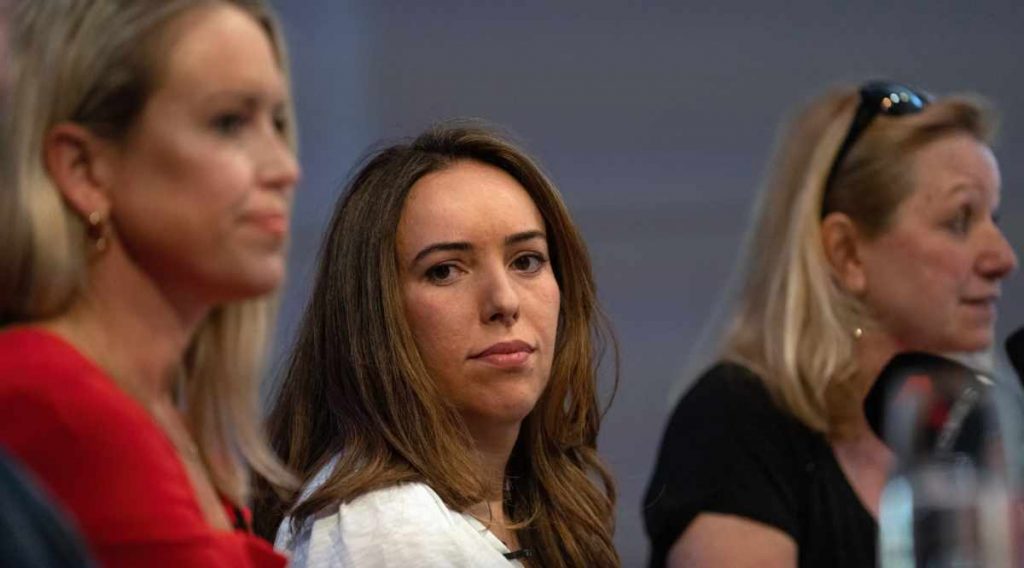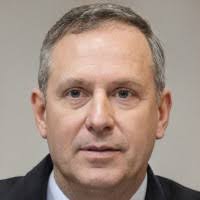
Stella Moris was the WikiLeaks founder's lawyer during his trial before becoming his wife and the mother of his children. She promised to fight for his release and never give up until they were reunited.
If Julian Assange is still alive today, it is surely because of his wife Stella, who has fought tirelessly for his integrity and rights. A leading international lawyer, Stella Moris was born 38 years ago in South Africa, under the name Sara Gonzales Devant. She first represented Julian Assange when he was accused of rape in Sweden (a case that was dismissed in 2017) before becoming his spokesperson around the world. Finally, they got married and she gave him two children. Or rather the other way around, she gave him two children before marrying him.
The nuptials took place last March during the inmate's daily release time from Belmarsh high security prison in London, where Julian Assange has been held since 2019. His fault: he allegedly interfered with the application of his probation in 2010, at a time when the complaint against him for sexual assault had not yet been closed. But for Stella, the truth is elsewhere: "The United States wants to try him for espionage and imprison him for life. They don't forgive him for leaking documents that shed light on war crimes in Afghanistan and Iraq in the wake of 9/11. Nor for revealing emails from Hillary Clinton's staff that suggested the 2016 primary vote was flawed. They are doing everything they can to extradite him, and so far, they are well on their way to doing so." Indeed, on 20 April, the London prosecutor's office finally authorised his extradition to America. But Stella Moris is not defeated by this. She continues to struggle and to throw all her strength into the battle, organising hearings, demonstrations, public meetings, multiplying interviews and tweets to make herself heard.
Do you intend to appeal the extradition decision?
We have filed an appeal, we are still waiting for a response. But no date has been set.
Julian Assange, your husband, recently suffered a "micro stroke" (more precisely a temporary ischemic attack). What is his condition now?
He is undergoing treatment to prevent a recurrence. But his physical and mental health is deteriorating day by day.
Do you fear that he may commit suicide?
Yes. At the last hearing, he was subjected to a psychiatric examination. Five doctors detected suicidal tendencies in him, and he could easily act out if the prospect of extradition were to materialise.
"His humanity is being taken away from him day after day".
Does he receive any form of psychological support in prison?
Yes, but it is totally insufficient. Belmarsh is a terrible prison.
Some people call it the British Guantánamo. Do you think he is being treated inhumanely?
I think his humanity is being stripped away day by day.
What do you mean by that?
When you dehumanise a person, you can then do whatever you want with them. With Julian, it was very methodically orchestrated. With the rape accusation, his reputation was attacked, then doubts were raised about the objectives of his journalistic work, and finally, Julian's name was associated with unsavoury people (following the scandal of the revelation of Hilary Clinton's campaign emails, part of the American press suggested that Assange had conspired with the Russian government to get Donald Trump elected). Everything has been done to erase the successes achieved by WikiLeaks, which changed forever the way we think about information.
In short, they tried to compromise a man who had been nominated for the Nobel Peace Prize several times.
They have turned him into a renegade, who can be arrested under false pretences, extradited and sentenced to life. They are trying to make him invisible.
In a recent interview, you said that you are forbidden to divulge the photo of your wedding.
Yes, for security reasons, I was told. This is absurd: how could the portrait of two newlyweds compromise state security? But that's not all: from now on, he is no longer allowed to attend the hearings. He has to participate by video conference. Everything is done to remove him from the public eye and compassion.
It's not easy for him to regain his form and the time he has lost.
Giving him back a face is the meaning of your struggle. Can you describe his appearance today?
Julian is slimmed down, he has short hair and a nice beard. He is very different from the images of him that circulated at the time of his arrest. He had a beard and long hair because his hairdresser was not allowed into the Ecuadorian embassy where he was holed up. His shaving kit was also confiscated. What is happening to him has a name: persecution.
When did this persecution start?
He has always been attacked because, throughout his career, he has never ceased to enrage the representatives of various powers: institutions, banks, media empires. But the situation has worsened under Trump. Obama never allowed himself to hold Julian hostage; to do so would have meant compromising the freedom of the press, which is fundamental to democracy. Trump had a more aggressive relationship with the media, which explains that.
What is Biden's attitude?
He is following in Trump's footsteps. I am disappointed. I imagined that there would be a change of framework. But I've come to understand one thing…
What's that?
That it suits everyone to keep him silent in prison, even if they would still prefer to see him six feet under.
What will you do if he is extradited?
I would continue to fight for his return to me and the children. That's what I always tell them too. Sometimes they complain that I never stop working, so I explain that I do it so that we can all be together.
"We wanted children, and we got them".
What is Gabriel and Max's relationship with their father?
They love him and they know he loves them. I tell them every day that their father would like to be with us, that the four of us are a family.
How often do they see him?
Several times a week. We are allowed one-hour visits during which we are obliged to sit around a table. Sometimes we draw, other times we read books. He tickles the children and hugs them.
As the conversation becomes more intimate, Stella's confident gestures lose their precision and a new face emerges with a shy smile as she recalls these family scenes.
You conceived your children while Julian was a refugee in the Ecuadorian embassy. Didn't this difficult situation discourage you from starting a family?
The circumstances were certainly unfavourable, but we were not discouraged. We wanted children, and we had them.
How did you feel when you first realised you were pregnant?
A mixture of joy and terror.
How did you tell your husband?
I wrote to him. At the embassy there were cameras everywhere and to communicate intimate information it was best to write it down on a small folded piece of paper, so that you could read it while curled up so that no one could see or hear. Julian was very happy and a bit worried. But in the end we realised that the only thing that was certain was our love. We staked everything on that.
Was it love at first sight between you two?
I wouldn't put it that way. I was struck by his intelligence. He's a curious, magnetic man, he wants to know more about the person in front of him. The conversation between us was immediately pleasant, and although I found him attractive, the love came later.
Who made the first move?
I think it was him. We were already good friends when that spark happened.
"Prison leaves an imprint that you have to free yourself from when you get out".
Were you ever afraid of getting into such a complicated relationship?
I did have some doubts, because I feared for my physical integrity and that of my family.
You went so far as to change your name to protect yourself.
I didn't want anyone to have any information about me.
Once, when asked about his predicament, Julian Assange replied that "you should be proud to live an unusual life". Do you agree or do you dream of a more ordinary life?
I dream of a more ordinary world, where you don't end up in prison for allowing the truth to come out.
Do you teach your children to choose truth over freedom?
No, I tell them that we should never have to make that choice. I tell them that what we are going through is unjust, that it is not normal, but that one day it will stop and their father will come home.
If this were to happen tomorrow, what would you do?
I have sometimes dreamed of organising a big party for his return, but I don't think that's really appropriate. Prison leaves an imprint that you have to get rid of when you get out. I would try to move him to the countryside for a few months, in the middle of nature, with no other imperative than to get back into shape and to recover lost time.

Written by Michael Zippo
Michael Zippo, passionate Webmaster and Publisher, stands out for his versatility in online dissemination. Through his blog, he explores topics ranging from celebrity net worth to business dynamics, the economy, and developments in IT and programming. His professional presence on LinkedIn - https://www.linkedin.com/in/michael-zippo-9136441b1/ - is a reflection of his dedication to the industry, while managing platforms such as EmergeSocial.NET and theworldtimes.org highlights his expertise in creating informative and timely content. Involved in significant projects such as python.engineering, Michael offers a unique experience in the digital world, inviting the public to explore the many facets online with him.
